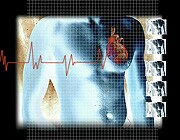
TUEDAY, Nov. 16 (HealthDay News) — Implantable cardioverter defibrillators (ICDs) that are removed from patients — either because of infections or for necessary upgrades — can be safely used again for new patients, new research indicates.
The observation is based on a small study of 31 patients in India who had ICDS implanted that had already been used and removed from other patients.
The study, led by Dr. Behzad Pavri, an associate professor of medicine at Thomas Jefferson University in Philadelphia, is slated for presentation Tuesday at the American Heart Association annual meeting in Chicago.
Before re-implantation, all the removed ICDS (which had a battery life of 70 percent or more when extracted from the original pool of patients) were cleaned and sterilized.
In turn, they were implanted in patients diagnosed with a life-threatening irregular heart beat condition (arrhythmia). Pavri and his colleagues noted that the recipients would have been too poor to afford new ICD devices outside of the study.
The authors followed the patients for an average of two years and two months. During that time, none of the patients experienced ICD-related infections, and more than 40 percent got the expected life-sustaining shocks such devices are designed to deliver when appropriate.
About 16 percent of the patients did, however, have to receive a second re-sterilized, used ICD three years following the first implant when the battery finally expired.
If the findings hold up upon further investigation, the authors suggest that their re-use strategy could have be beneficial for low-income populations down the road.
More information
For more on ICDs, visit the American Heart Association.

